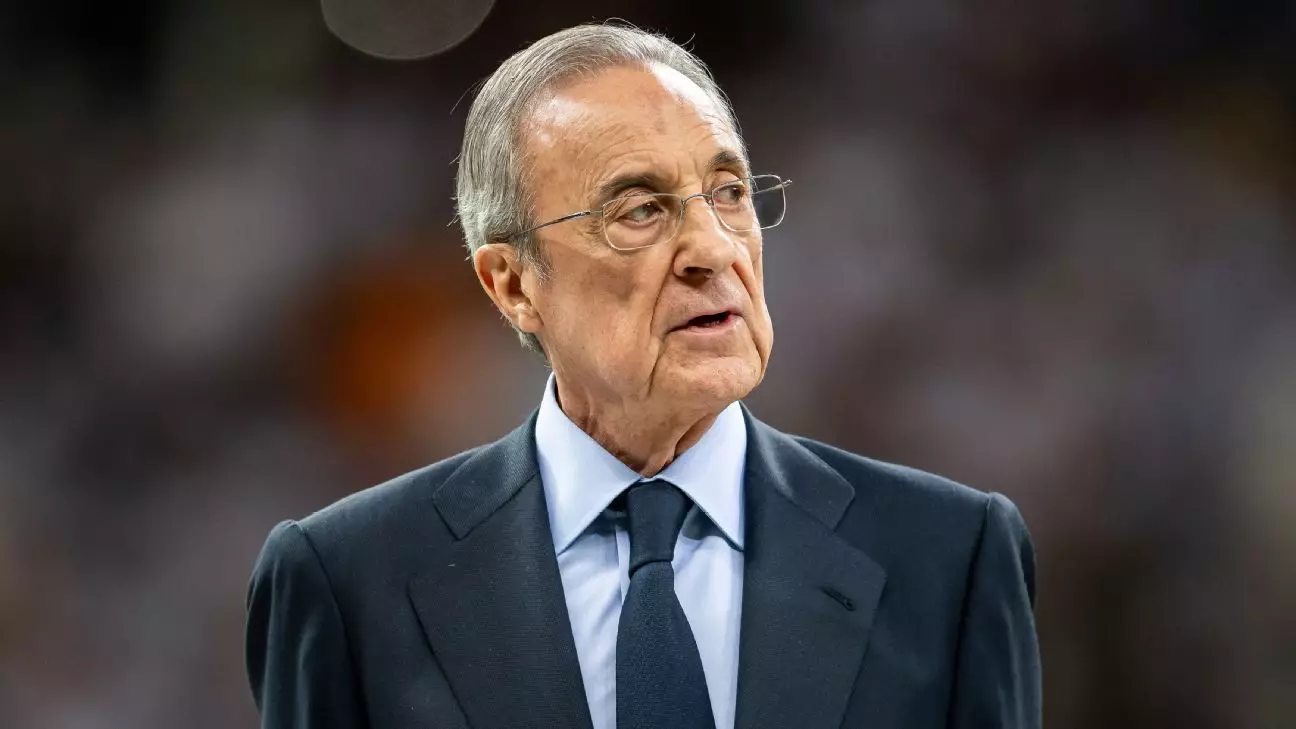Real Madrid’s president, Florentino Pérez, recently made headlines with a stunning announcement regarding a potential “corporate reorganisation” of one of the world’s most iconic football clubs. His remarks, delivered during the club’s annual assembly, were not just a routine update but a clarion call to ensure that Real Madrid remains a member-owned institution amid growing challenges. Pérez’s assertions underline a critical moment in the club’s history, where the stability and integrity of its financial assets are under scrutiny.
The majority of Spanish football clubs have transitioned into public limited companies, but Real Madrid stands with Barcelona, Athletic Club, and Osasuna as the few remaining member-owned entities. Pérez articulated a clear intention to preserve this model, suggesting that the complexities involving LaLiga’s financial strategies necessitate a reevaluation of the club’s ownership structure. Particularly, a recent kerfuffle concerning the LaLiga-CVC investment deal raised alarms within the club. While many clubs benefited from a substantial €2 billion payout for future broadcast revenues, Real Madrid felt slighted and threatened by a system that appears to diminish their financial footing.
With such significant financial disparities in Spanish football, Pérez argued that surrendering control over key assets could leave the club vulnerable. He emphasized the need for a protective framework that guarantees members—not external investors—retain true ownership of Real Madrid. The tone of urgency in Pérez’s message leaves one pensive about the implications of losing a member-driven model in favor of potentially transient corporate interests.
The assembly also highlighted a different kind of struggle—an ongoing debate about player recognition and accolades. Pérez did not shy away from addressing the controversial absence of Vinícius Júnior from the top contenders for the 2024 Ballon d’Or. His disappointment reflects broader issues in media perceptions and the criteria by which such honors are awarded. He contended that ignorance or bias among voting journalists led to a misunderstanding of Vinícius’s prowess, which, in Pérez’s view, should have warranted significant recognition.
The president’s nostalgic homage to the club’s stalwarts—such as Dani Carvajal and Jude Bellingham—further emphasizes the need for structural integrity in acknowledging talent. His call for an independent organization of the Ballon d’Or aims to empower respectable individuals to take charge, thereby ensuring that the accolades truly reflect the essence of football excellence.
In the context of broader football governance, Pérez’s speech snares the listener with its appeal for a paradigm shift. His finger is pointed squarely at UEFA and the current Champions League format, which he claims are archaic and in dire need of transformation. Drawing a vivid analogy between football’s current state and the fate of defunct video rental chain Blockbuster, Pérez highlighted the necessity of embracing modernity and technology—an appeal for football to evolve and not be marginalized in an increasingly competitive entertainment landscape.
Pérez fervently stated that “the moment is critical. It’s time to act.” This mantra resonates with many who feel disillusioned by stagnant structures in football, signaling that Real Madrid under his leadership intends to lead the charge for necessary changes.
Ultimately, Pérez’s ambitious vision calls for extensive discussions amongst club members concerning governance and financial sustainability. The proposed corporate reorganisation is not merely about adjustments on paper but speaks to a deeply ingrained philosophy of football that champions member ownership above all. As debates swirl regarding the appropriateness of the current accolades and the governance of European football, the challenge ahead involves aligning traditions with contemporary demands.
Real Madrid’s future is laden with challenges, but under Pérez’s stewardship, the navigational compass appears set on defending the club’s legacy while boldly embracing innovation. The next steps taken will be crucial in determining whether the essence of Real Madrid can both withstand external pressures and thrive in the modern era of football.
